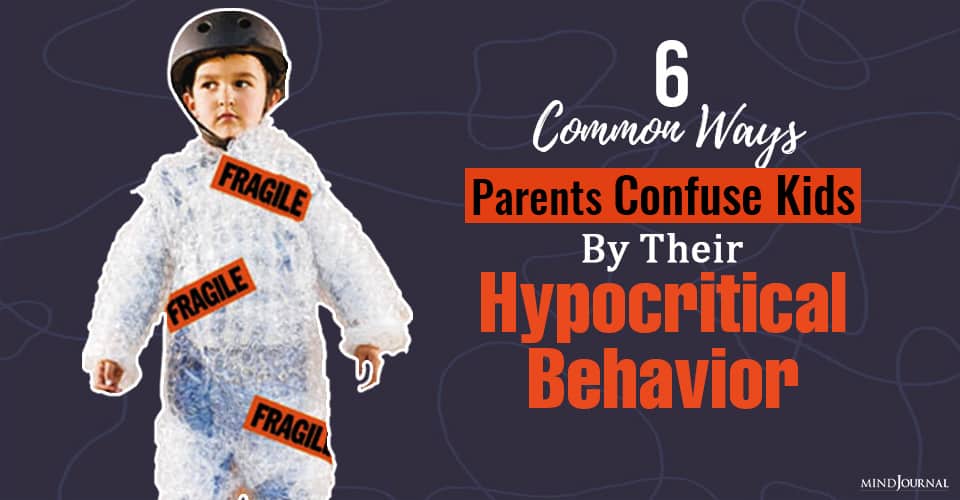Growing up, a kid’s emotional world is bigger than the world they live in. They focus on the surroundings and we parents, unconsciously teach them many things that we didn’t mean to, we contradict ourselves. And because of this they feel confused as they cannot understand the difference between their parent’s world and the world that their parents are showing them. in some ways parents, hypocritical behavior confuses their kids and causes instability in them.
We are all born with the power to sense emotions in others. It might be a basic survival skill for humans and animals. This ability usually subsides in childhood as we learn to focus more on verbal cues than emotional ones. As for the kids, they are the biggest copycats in the world. They tend to mimic and pick up the activities their parents do.
For instance, be ready to answer when your kid catches you stealing some chocolate time for yourself when you yourself made the rule of only two candies in a week (well for your kids anyway).
Parenting isn’t easy, hands down, and choosing parenting strategies is downright exhausting. We folks mean well, we know it. Their young, innocent, and totally vulnerable way of thinking is so easily influenced by whatever is going on around them, be it good or bad. Here communication is the key, but while the parent may have thought it was clear, the child did not. As a result, it might come as a mixed signal.
Related: 7 Things Common In Children Raised by Over Controlling Parents
Here we want to shed some light on the situations when parents confuse their kids by their Hypocritical Behavior
1, You can’t watch the TV, but I can.
Parents teach their kids to always tell the truth and to accept the consequences of their behavior. But sometimes they break this rule themselves. There is a screen time limit for your kid and that is completely alright until your kid catches you staring at your phone almost all day long. You are confusing the poor soul with this hypocritical behavior.
2. You need to eat all the vegetables
One common notion is that expecting good behavior from your children when you haven’t exactly been a saint yourself. Parents want their kids to be in good health, but for that, they are compromising their kid’s taste buds. While it is an essential rule for your kids to take the fibers, you yourself have been removing the broccoli out of your pasta. Think mom, you are making it harder for your kid.
3. There is a big spider outside! Actually, there is not.
It’s actually understandable when you feel overwhelmed and try to get things done your way by simply scaring them. Also, it’s you who said some days back that the damn house is theirs’s so there’s no need to be scared because their folks will protect you. Get your head straight mom and dad.
4. It’s 8, Let’s go to sleep buddy
Now, talk about hypocrisy. You really don’t want to hear anything from your kids before lights out and after you perfectly played the role of a warden, it’s time for you to binge-watch Netflix. Just pray to all the mighty that your baby stays tucked in and don’t look for you.
5. This dress will look nice on you, trust me
How would you feel if someone tries to dress you up as a giggle bunny? Well you don’t even want to think about it, right? That is how your child feels when you play Barbie with them. Yes, they are little, but they are smarter than you know. They have their own taste already. Just try to get them what they want to wear. They are the cutest, they don’t need any accessories.
6. Be yourself, Don’t care what others are thinking.
Double standards much? Believe it or not, we all expect our kids to behave which we, as an adult cannot do. Parenting notion? maybe! While it is perfectly normal for you to teach your children to act be on their true shelf, But before that, you need to stop looking at the mirror and visualizing what others will be thinking upon seeing you. Kids follow your path, remember?
Related: 11 Signs of Bad Parenting! Are You Guilty of Them?
As parents, we always want the best for them and decide for them without even taking into account their opinions. You want them protected, but there are some things kids need to learn by themselves, by experiencing inconvenience.
Kids need to speak for themselves otherwise it will all be one-way communication and your kid will bottle up their emotions or they will become overly dependent. You want them to be confident, honest that is why at first you need to act that way. Lose that hypocritical behavior mommy and daddy. Rules are fine and sometimes’s essential too but don’t forget children may expect their parents to follow the rules as well.
These are some of the few situations where parents contribute to unnecessary confusion and uncertainty for their kids with their hypocritical behavior. Can you relate to yours?









Leave a Reply